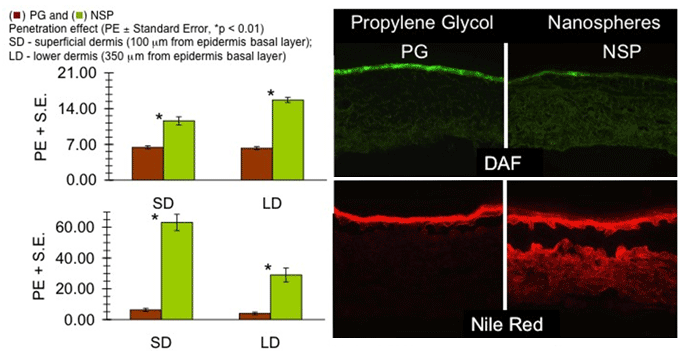Effective topical drug administration for dermal diseases offers significant advantages over oral or systemic treatments. Drug localization within the skin layers is important in the treatment of dermatological conditions such as psoriasis, where the seat of the disease is located within the skin. Novel drug delivery strategies can play a pivotal role in improving the topical delivery of therapeutics by enhancing their skin localization with a concomitant reduction of side effects and systemic absorption.
The objective of this research is to investigate the passive skin penetration of lipophilic model agents encapsulated within tyrosine-derived nanospheres. We studied the distribution of topically applied solute-nanosphere formulations in human cadaver skin using cryo-sectioning and fluorescence microscopy. Tyrosine-derived nanospheres significantly enhanced skin penetration of highly lipophilic fluorescent dyes DAF and Nile Red in human cadaver skin as compared to a non-particulate formulation, propylene glycol, at the same concentration (Figure 1). An increase in rate and extent of dye penetration to deeper skin layers could be attributed to the higher thermodynamic activity of the dye (relative to that in propylene glycol), small size and hydration properties of the nanospheres. In addition, no detectable transdermal permeation was measured, even after 24 hours application, suggesting that these nanospheres can be safely used in topical drug delivery.
Together, these studies suggest our nanospheres offer a promising tool for effective topical skin delivery of lipophilic drugs and personal care agents - as may be desired in the treatment of dermatological conditions such as skin cancer, psoriasis, eczema, microbial infection and/or in sunscreens and cosmetics.

Figure 1. Cross-sectional images obtained following 24 hours of passive permeation of DAF and Nile Red into human cadaver skin.
Project Leaders: Larisa Sheihet, PhD, Bozena Michniak, PhD
Funding Source: National Institute of Arthritis and Musculoskeletal and Skin Diseases (R01 AR056079-03)

